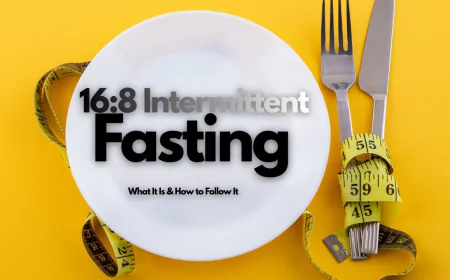Beginner Intermittent Fasting Schedule
Start your health journey with this beginner intermittent fasting schedule—easy, effective, and perfect for weight loss, energy, and better digestion.
You've undoubtedly heard of intermittent fasting if you're new to the world of weight loss and health. However, where do you begin? Which intermittent fasting schedule is ideal for beginners? Don’t worry—this guide is designed especially for beginners to help you understand everything about this trending eating pattern.
What Is Intermittent Fasting?
Intermittent fasting (IF) is an eating pattern that cycles between periods of eating and fasting. Unlike traditional diets that focus on what to eat, intermittent fasting focuses on when to eat. This makes it a flexible and easy-to-follow method for many people.
For those asking, "how to start intermittent fasting?", the answer lies in following a simple and gradual beginner intermittent fasting schedule.
Why Choose a Beginner Intermittent Fasting Schedule?
Jumping into a 24-hour fast on your first try can be overwhelming. That’s why it’s important to begin with a manageable intermittent fasting for beginners plan. A beginner schedule helps your body adapt slowly without causing fatigue, headaches, or hunger crashes.
Best Beginner Intermittent Fasting Schedules
1. 12:12 Fasting Method
This is the easiest way to start. You fast for 12 hours and eat during the other 12 hours. For example:
-
Eat: 8 AM to 8 PM
-
Fast: 8 PM to 8 AM
This mild beginner fasting plan helps train your body without feeling deprived.
2. 14:10 Fasting Method
Once you're comfortable with 12:12, try the 14:10 method:
-
Eat: 9 AM to 7 PM
-
Fast: 7 PM to 9 AM
This slightly longer fasting window can boost fat burning and reduce snacking at night.
3. 16:8 Fasting Method
This is one of the most popular schedules for weight loss. You fast for 16 hours and eat during an 8-hour window:
-
Eat: 12 PM to 8 PM
-
Fast: 8 PM to 12 PM next day
This beginner intermittent fasting schedule is great once your body adjusts to shorter eating periods.
Benefits of a Beginner Intermittent Fasting Schedule
-
Weight Loss: It helps reduce calorie intake naturally.
-
Better Digestion: Gives your digestive system time to rest.
-
Improved Energy: Many beginners report more consistent energy levels.
-
Simple Lifestyle: No need to track calories or prepare multiple meals.
How a Novice Can Begin Intermittent Fasting
Step 1: Select the Appropriate Timetable
Start with a plan for 12:12 or 14:10. Avoid starting longer fasts right away. Any new beginner fasting plan requires time for your body to adjust.
Step 2: Drink plenty of water
Throughout the fasting window, stay hydrated. As long as no calories are added, herbal teas, black coffee, or lemon water are also acceptable.
Step 3: Consume Foods High in Nutrients
Make whole foods your main focus during your eating window. Incorporate:
-
Lean proteins (eggs, chicken, and tofu)
-
Complex carbs (brown rice, oats, quinoa)
-
Good fats (olive oil, avocado, and nuts)
-
Fruits and vegetables
Step 4: Pay Attention to Your Body
It's acceptable to feel a little drained or hungry at first. However, if you feel lightheaded or unwell, stop fasting and reassess your plan.
Common Mistakes Beginners Should Avoid
-
Skipping Meals and Overeating Later: Don't binge during your eating window. Eat balanced meals.
-
Not Drinking Water: Fasting can lead to dehydration.
-
Choosing the Wrong Foods: Avoid sugary, fried, or overly processed items during your eating window.
-
Being Inconsistent: Stick to your chosen beginner fasting plan for at least 1–2 weeks to see results.
Beginner Intermittent Fasting Schedule for Weight Loss
-
Day 1–2: 12:12
Fast: 8 PM to 8 AM
Eat: 8 AM to 8 PM
-
Day 3–4: 14:10
Fast: 7 PM to 9 AM
Eat: 9 AM to 7 PM
-
Day 5–7: 16:8
Fast: 8 PM to 12 PM
Eat: 12 PM to 8 PM
By the end of the week, your body will feel more comfortable with longer fasting windows.
Who Should Avoid Intermittent Fasting?
While intermittent fasting for beginners is generally safe, it’s not for everyone. Avoid IF if you:
-
Are pregnant or breastfeeding
-
Have a history of eating disorders
-
Have diabetes or low blood sugar issues (consult your doctor first)
-
Take medications that must be taken with food
Always talk to a healthcare professional before starting any new diet plan.
Final Thoughts on Starting a Beginner Intermittent Fasting Schedule
Starting a beginner intermittent fasting schedule can be a life-changing step toward better health. It’s simple, flexible, and doesn’t require you to count calories or give up your favorite foods.
Remember, the key is consistency and patience. Start with shorter fasts, eat mindfully during your eating window, and give your body time to adjust.
By following this intermittent fasting for beginners guide, you’ll be well on your way to improved health, more energy, and even weight loss—naturally and sustainably.
FAQs
Q: How many days a week should I fast as a beginner?
A: Start with 5–6 days per week using a 12:12 or 14:10 fasting schedule.
Q: Can I exercise while fasting?
A: Light workouts like walking or yoga are fine. For intense workouts, try scheduling them during your eating window.
Q: When will I start seeing results?
A: Most people notice changes in energy and appetite within the first week. Visible weight loss results may take 2–4 weeks.




























